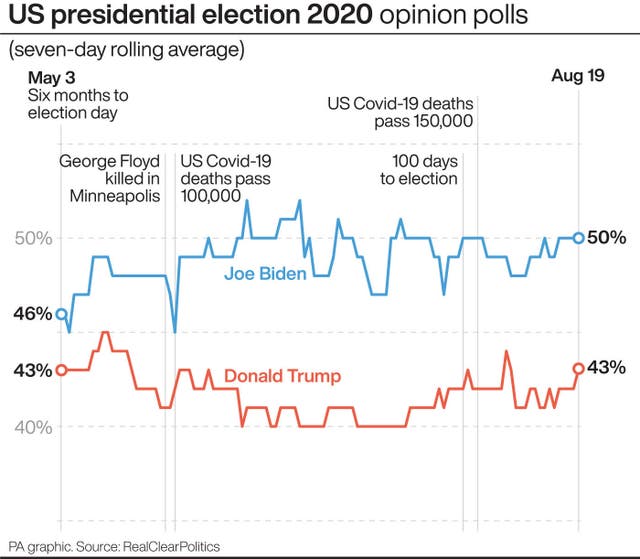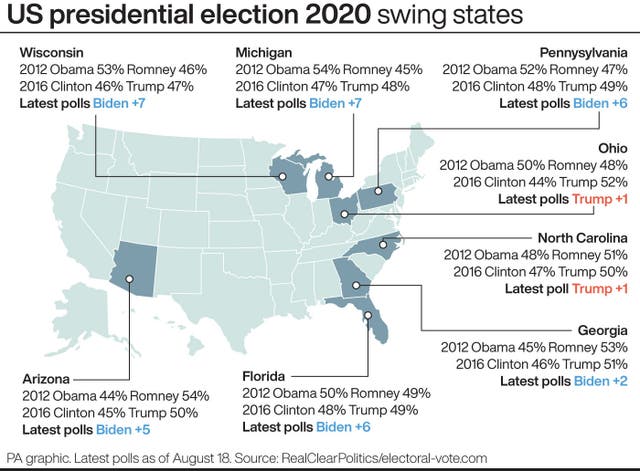Former US president Barack Obama has warned that American democracy could falter if Donald Trump is re-elected in the autumn.
Obama’s stunning rebuke of his successor was echoed by Kamala Harris at the Democratic Convention as she embraced her historic role as the first Black woman on a US national political ticket alongside presidential hopeful Joe Biden.
The former president – who broke barriers himself as America’s first Black president – pleaded with voters to “embrace your own responsibility as citizens – to make sure that the basic tenets of our democracy endure”.
Obama warned: “Because that’s what is at stake right now. Our democracy.”
Speaking from the Museum of the American Revolution in Philadelphia, the former president said: “Donald Trump hasn’t grown into the job, because he can’t.
Describing Biden as his brother, he continued: “I have sat in the Oval Office with both of the men who are running for president.
“I never expected that my successor would embrace my vision or continue my policies. I did hope, for the sake of our country, that Donald Trump might show some interest in taking the job seriously.”

Obama’s confidants say that the former president’s support for Biden is unequivocal, but he worries about enthusiasm among younger voters, particularly younger voters of colour.
Democrats concede that one of the reasons Trump won the presidency in 2016 was because those voters did not show up in the same large numbers as when Obama was on the ballot.
Throughout their convention, the Democrats have summoned a collective urgency about the dangers of Trump as president.
We can’t go back to the way things were before these crises, because things weren’t working for far too many Americans. Tonight, we’ll discuss our plans to build back better and set this nation on a new path. https://t.co/N35wrjKcPj
— Joe Biden (@JoeBiden) August 20, 2020
In 2016, they dismissed and sometimes trivialised him. Now they are casting him as an existential threat to the country. The tone shift signals that the campaign between Trump and Biden, already expected to be among the most negative of the past half century, will be filled with rancour and recrimination.
However, on the third night of the Democrats’ four-day convention, party leaders also sought to put forward a cohesive vision of their values and policy priorities, highlighting efforts to combat climate change and tighten gun laws.
They drew a sharp contrast with Trump, portraying him as cruel in his treatment of immigrants, uninterested in the nation’s climate crisis and out of his depth on virtually all of America’s most pressing challenges.
Democrats also demonstrated a hope that Biden, a 77-year-old white man, can revive the coalition that helped put Barack Obama into office, with minorities, younger voters and college-educated women countering the effect of Trump’s hold on many white and rural voters.
The evening marked a celebration of the party’s leading women, including remarks from Hillary Clinton, the first woman to become a major ticket presidential nominee, US house speaker Nancy Pelosi and Massachusetts senator Elizabeth Warren, who challenged Biden during the primary and is now supporting his campaign.
Harris, a 55-year-old California senator and the daughter of Jamaican and Indian immigrants, addressed race and equality in a personal way Biden cannot when he formally accepts his party’s presidential nomination on Thursday.

“There is no vaccine for racism. We have got to do the work,” Harris said.
“We’ve got to do the work to fulfil the promise of equal justice under law. None of us are free until all of us are free.”
With just 76 days to go before the election, Biden must energise the disparate factions that make up the modern Democratic Party – a coalition that spans generation, race and ideology. This autumn, voters must deal with concerns over the Covid-19 pandemic that has created health risks for those who want to vote in person, as well as and postal slowdowns for mail-in ballots, which Democrats blame on Trump.
Democrats hope that Harris and Obama in particular can help bridge the divide between those reassured by Biden’s establishment credentials and those craving bolder change.
The pandemic forced Biden’s team to abandon the traditional convention format in favour of an all-virtual affair that has eliminated much of the pomp and circumstance that typically defines political conventions.

It was completely silent, for example, as Harris took the stage to make history at the Chase Centre in Wilmington, North Carolina.
She was flanked by American flags but no family, and her audience consisted of a few dozen reporters and photographers.
After two nights that featured several Republicans, the proceedings on Wednesday emphasised core Democratic values on areas like climate change and gun violence that particularly resonate with younger voters.
On guns, Biden wants to repeal a law shielding firearm manufacturers from liability lawsuits, impose universal background checks for purchases and ban the manufacture and sale of assault weapons and high capacity magazines.
On climate, Biden has proposed a two trillion dollar (£1.51tn) plan to invest in clean energy and end carbon emissions from US power plants by 2035, even though his proposals do not go as far as activists’ preferred “Green New Deal”.

On Wednesday night, former Arizona representative Gabby Giffords reflected on her own journey of pain and recovery from a severe brain injury nearly a decade after being shot while meeting with constituents. She urged America to support Biden.
“I struggle to speak, but I have not lost my voice,” Giffords said. “Vote, vote, vote.”
Attention will soon turn to Trump. The president abandoned plans to host his convention in North Carolina and Florida, and is expected to break tradition and accept his nomination from the White House lawn.
In the meantime, he is seeking to take attention from Biden. Trump will appear at his Democratic rival’s birthplace of Scranton, Pennsylvania on Thursday. He is also participating in a prime-time interview with Fox News host Sean Hannity.
Hillary Clinton, who lost the 2016 election to Trump, implored Democrats to turn out in larger numbers in November to block the president’s re-election.
The former US secretary of state said: “For four years, people have said to me: ‘I didn’t realise how dangerous he was.’ ‘I wish I could go back and do it over.’ Or worst: ‘I should have voted.’
“Well, this can’t be another woulda coulda shoulda election.
“Vote like our lives and livelihoods are on the line – because they are.”

















